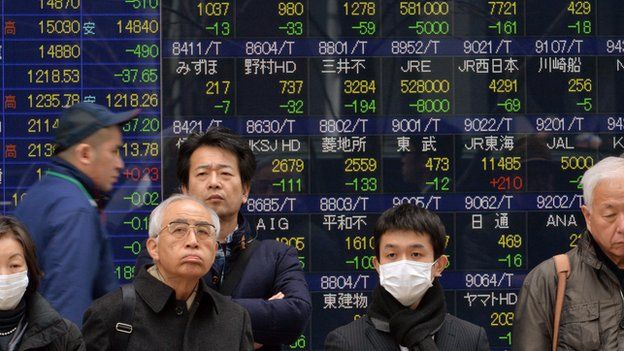June, 30, 2015

Shares in Asia were mostly up on Tuesday, beginning to recover some of Monday's losses despite fears of a Greek debt default.
In Japan, the Nikkei 225 share index was up 0.36% at 20,181.55points.
EU leaders earlier warned Greeks that rejecting creditors' proposals in a snap referendum called for Sunday would mean leaving the euro.
Talks between Greece and its creditors broke down last week, leading to Greek banks having to shut this week.
Earlier, Standard & Poor's ratings agency downgraded Greece's credit rating one notch further into junk territory.
The agency also said there was a 50% chance Greece would exit the eurozone.
Greek Prime Minister, Alexis Tsipras, has defended his government's handling of the country's debt crisis however and said the result of Sunday's referendum on the latest bailout proposals would signal further negotiations.
In Australia, the benchmark S&P/ASX 200 was up 0.25% at 5,436.10 after closing down more than 2% on Monday.
In South Korea, the benchmark Kospi was up 0.25% at 2,065.69after suffering its biggest daily percentage fall since late May on Tuesday.
Official data out in South Korea on Tuesday showed that industrial output fell 1.3% in May compared to April. The May numbers mark the third consecutive monthly drop in manufacturing activity as the country continues to struggle with slower demand for its exports.
In China
Mainland markets opened lower on Tuesday, with the Shanghai Composite down 1.14% in early trade at 3,994.16 points. The index saw another day of volatile trade on Monday which saw shares fall more than 7% at one point.
The sharp falls on the mainland have come despite a surprise rate cut by the central bank on Saturday.
In Hong Kong, the benchmark Hang Seng index was in positive territory however, up 0.54% at 26,100.74.
Unwelcome fault-lines
While some economists had predicted Asian markets would quickly recover from Monday's losses, others pointed to longer term concerns.
"It is not a default of Greek debt that is worrying the market, but the future of the euro," David Kuo of The Motley Fool in Singapore told the BBC.
"The Greece saga has exposed unwelcome fault lines in the euro - when you roll an olive in mud you get a muddy olive," he added.
However Mr Kuo said the "current mess" would eventually get cleared up. "It might take a while, but sooner or later it will get cleared up," he said.
"If central banks ever want to replace the lost billions from a Greek debt default, they could do so if they wanted.
"They just have to fire up the printing press and print more money, again.
"And that is worrying," he added.
BBC
Video Story